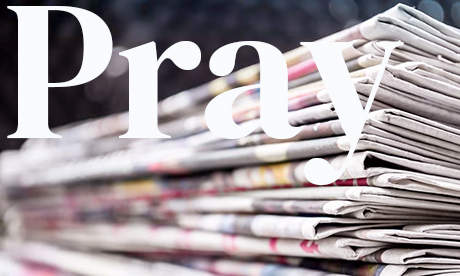Their delighted screams echoed through the yard, my six-year-old happily jumping onto the slide to make her way down to the ground, running from her father as he chased her.
I couldn’t help but smile as the scene unfolded: a little girl happily playing in the safety of her own backyard, dinner waiting inside, a warm bed to tuck into just a few hours later.
And then my smile faded as I realised that this idyllic domestic moment is a luxury not afforded to hundreds of thousands of others halfway around the world.
Reports of the Hamas terrorist attacks on Israel came fast and furious over the weekend, and as the death toll has increased and more details emerge about the horror of October 7, it is hard to look away.
And perhaps we shouldn’t look away.
We shouldn’t look away from the horrors of that day, or the impending war that will likely not settle generations worth of conflict.
It is only in seeing the tragedy that we can respond to it.
But there’s the challenge.
We see tragedy again and again, and we begin to become desensitised to it, and stop responding.
The news cycle is never ending, often grim, this constant barrage of data and descriptions and images and videos, keeping us abreast of a situation.
It isn’t called “olds,” after all.
It’s called “news” because it is new information gained and shared bit by bit.
We consume it constantly, clicking, scrolling, sharing, and commenting, engaging with the new information as it arrives, formulating opinions quickly, seeking to garner more information to create a broader understanding.
There’s nothing wrong with consuming the news. If we know when to stop consuming it, or if we know how to consume it.
Asking the Lord to give us a heart to feel
It isn’t that we are incapable of handling bad news.
Perhaps we were not made to know quite so much of it.
Perhaps the human heart can only hold so much tragedy and horror.
Maybe reading and consuming the news is the entirely wrong approach. Maybe we’re meant to “pray the news.”
A religious sister friend once said this on social media: “we need to pray the news.”
If all we do is read and ingest information, we’re filling our minds with horrible images, heavy moments.
We begin to formulate solutions we’re far from informed enough to create or powerful enough to enact.
And so the horrible image and the heavy moment begin to feel hopeless, and we feel helpless.
Simply reading the news and becoming informed about a terrible situation is a passive approach to the tragedies of the day.
It can lead to the smile falling off your face when you realise millions of people will have no safety, peace, comfort, or delightful afternoons in their backyard because of terrorist attacks and impending war.
And we should feel deeply the suffering and hurt of others.
We should be informed of the circumstances that have led to violence, death, and destruction.
We can’t just look away.
But if we are looking, we should look with the eyes of faith.
We should look with eyes that fill with tears as we cry to heaven.
- Praying the news is not passive, far from it.
- “Praying the news” is responding, with a voice lifted to heaven and a heart turned to the love of God, asking Him to bring peace and comfort to those in need.
- “Praying the news” takes the heavy moment and asks the Lord to carry it with you.
- “Praying the news” is going to our Father in heaven and imploring him to care for his people on earth.
- “Praying the news” is realizing that the most significant thing we can do when we’re so far removed from tragedy is asking the Lord to give us a heart to feel, eyes to see, and a mind to understand.
Pope Francis has called us to prayer in light of the tragic attacks on Israel and the unfolding war.
He has asked us to consider war a human tragedy that hurts us all.
Would that we all not just watch, listen to, or retweet the news, but rather, pray through the news in these coming days.
- Katie Prejean McGrady is an author, speaker, and host of The Katie McGrady Show on Sirius XM’s The Catholic Channel and a regular contributor to La Croix International. She lives, works, and writes from Lake Charles, Louisiana.
- First published in La-Croix International. Republished with permission.
